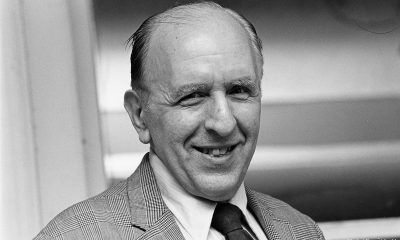a&e features
The straight and narrow?
D.C.’s two largest LGBT choirs have straight directors
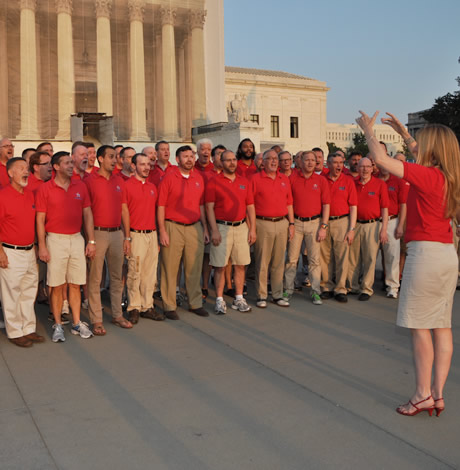
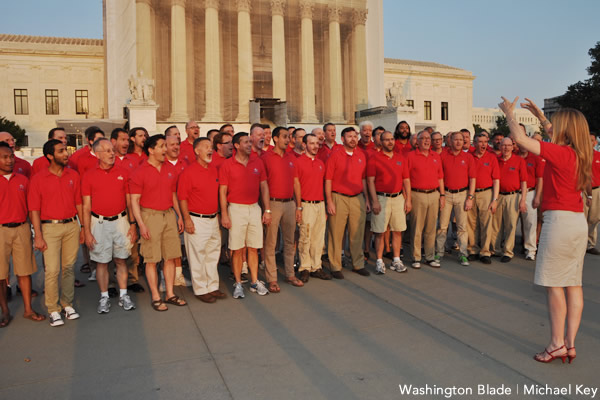
Thea Kano directs the Gay Men’s Chorus of Washington at the U.S. Supreme Court. (Washington Blade photo by Michael Key)
Jeff Herrell, a decade-plus member of Metropolitan Community Church of Washington, the region’s largest mostly LGBT church, was at the Fellowship’s general conference last year and as he sat listening to a pastor from Indianapolis, something he heard rubbed him the wrong way.
The crux of the argument was that if the Fellowship of Metropolitan Community Churches, a network of LGBT-welcoming churches started by Troy Perry in 1968 in the face of almost universal condemnation of gays by mainstream Christian churches, is to survive, it will need to engage straight believers as well.
It’s not a new concept. Many LGBT activists have stated the movement would have achieved far less traction over the past 40-odd years without ally aid. But for Herrell, a Washingtonian of 15 years and a gay believer, the statements inspired an internal groan.
“When I heard that, my first thought was, ‘Oh gosh, really?,’ he says. “It’s a challenge for me because MCC for me is like my personal gay sanctuary away from the straight world in a way.”
A pragmatist, though, Herrell also recognizes the world is changing.
“There is an element of it that’s a little sad, but you know what, we’re old,” he says with a laugh. “This is a post-‘Will & Grace’ world and it’s just not the same as it used to be. It’s like when all the straight girls started going to the gay clubs for their bachelorette parties, you know. I thought, ‘Jesus, I hate this, go somewhere else,’ but you know what? Here we are 10 years later.”
In August, the Gay Men’s Chorus of Washington, a 34-year-old local choir that has about 240 active members and is one of the oldest and largest such groups in the country, announced Thea Kano as its new artistic director. She is the successor to Jeff Buhrman who was at the helm 13 years and involved with the Chorus for 25, and is the first straight director in the group’s history. Chase Maggiano, GMCW’s executive director, says her proven history with the group — she’d been its associate director since 2004 — was considered, but she was given no bonus points over the 30 applicants and four other finalists who applied during a seven-month national search.
“She went through every step of the process just like everyone else,” Maggiano says. “As soon as it was announced that Jeff was resigning, we started getting inquiries. … We figured she would apply but we were up front with her that we were going to take our time to make this a fair and open process so that whomever was ultimately appointed, was legit. We wanted a legitimate and fair process and that was my commitment to the process to kind of be the fairness czar.”
So thorough, in fact, was the process, it was a source of angst for some GMCW singers who’d grown to love Kano and feared she might resign if not given the job.
“We were really happy and really relieved when the news came out that she’d been appointed,” says Eric Peterson, a tenor who’s been in the Chorus five years and is also a member or the Rock Creek Singers, a smaller chamber ensemble within the overall Chorus that Kano has directed for a decade. “I don’t know if she might have stayed either way. She was very careful not to say, but she has a doctorate in choral conducting and has studied and worked with some of the most famous conductors in choral music so I can’t imagine she would have just stuck around indefinitely. … When the news came out, there was a huge sigh of relief and a lot of applause.”
Kano, who splits her time between Washington and the Big Apple directing the 80-voice New York City Master Chorale, says she’s thrilled.
“I’m like a kid in a candy store,” she says. “I really get the best of all worlds here.” She says there was “no yearning” for the chief role even when people started asking her if it was a goal after she’d been with the Chorus a couple years, though she also says when Buhrman announced he was stepping down, applying herself was “a no brainer.”
“Having been here so long, I have that institutional memory and I’ve seen how we’ve grown musically,” she says. “I recognize the things that have really worked and well the audience appreciated this or that. … My goal is to continue with a phenomenal musical product to drive home our overall message of equality.”
When the choir at MCC-D.C. met Michael Fisher Jr., who just started as the church’s “minister of worship arts,” they didn’t know his sexual orientation. The church for years had two choirs with as many as 40-50 singers in the combined group. It has dwindled some in recent years without a full-time director. Several former singers are now active with former director Shirli Hughes’ group Ovation.
Fisher is classically trained on the cello and piano and has worked with several well-known gospel acts. What struck them initially during an audition rehearsal, Herrell says, was his stellar musical ability.
“We just kind of assumed he probably was gay but we didn’t know,” Herrell says. “We had a rehearsal with him and it just went really, really well. He can play the piano like nobody’s business and he’s also just so vocally talented too. … He had a way of teaching that was very easy and he was able to make himself understood. Within like 15-20 minutes, he had us singing a song he’d taught us. It was a great experience and I think everyone was just excited to find someone that talented interested in the position because we have a history of a very strong music program here and it’s something we definitely want to uphold.”
As with the GMCW, the search committee, pastoral staff and board of directors at MCC-D.C., founded in 1970, took its time in the search. All the church’s former choir directors have been LGBT.
Justin Ritchie co-directed the MCC choir for several years with Darius Smith but neither were interested in doing the job full-time. In a series of evaluations, the congregation there — which Herrell guesses is “probably less than 1 percent straight” — wanted someone in this new position in a full-time capacity.
Rev. Cathy Alexander, MCC’s minister of congregational connections, says the process was exceedingly thorough and says she’s excited to see Fisher join the staff. (Fisher did not respond to multiple attempts to interview him before this week’s Blade deadline. He’s started his new post but will be officially welcomed at special services at 9 and 11 a.m. on Sept. 14. The church’s senior pastor, Rev. Dwayne Johnson, also did not respond to interview requests.)
“First and foremost, he’s a very spiritual man, very dedicated to serving God, that came through first and foremost,” Alexander, who identifies as gender non-conforming, says. “He has an amazing ability, he writes his own songs and travels and sings. … He’s very personable and has already established a good relationship with the choir and dance ministries. He grew up in the church playing music, he’s a good fit for this position and his wife is just lovely, too.”
But despite thorough searches and stellar musical qualifications, is there any long-term concern about having the city’s largest LGBT choirs — the Lesbian and Gay Chorus of Washington having folded in 2010 (former director C. Paul Heins is now the GMCW associate director) — under straight leadership?
While several say it is a bit unusual and perhaps a sign of the times, nobody the Blade interviewed said it’s an important distinction. Kano, especially, several GMCW members said, has never inspired any doubt about her commitment to LGBT rights.
Ritchie, who has sung for years with the GMCW in addition to his duties at MCC, concurs.
“Thea has great gay sensibility if you will and she’s a great programmer,” he says. “She’s an artist and the Chorus couldn’t be in better hands. I think it will be a seamless transition with her in charge.”
Ritchie, who has yet to meet Fisher, says the role at MCC is a wholly different situation. He says because the role requires someone who can both conduct and accompany and who is stylistically diverse, it was a hard position to fill.
“At 9, it’s more like high church, then at the 11 o’clock service it’s straight-up black gospel and there are not many people who can do it all. I kind of faked my way through it for a year and a half … but it’s such a varied position.”
The spiritual component only further complicates the matter, Ritchie says.
“Concerned is probably too strong of a word and it’s really not my business anymore, but I would want to be sure that whomever they might have hired for this position has the best of intentions,” he says. “Is it somebody who really feels called to this church or is it just somebody who needed a job? That would be understandable, but it would be my hope that they would make sure it’s not somebody who’s coming in to convert anybody. It’s just so hard to fully understand the gay faith community in the context of past hurt or past injury if you haven’t experienced it that way. … There has to be not only the musicality, but also the safety and the celebration of who LGBTQ people are.”
Neither appointment is an anomaly, as far as anybody can tell. Other choruses within the Gay and Lesbian Association of Choruses (GALA) have had straight directors, although it is certainly not the norm.
Robin Godfrey, GALA’s executive director and a lesbian, says she’s known of some straight conductors but says she’s not given much thought to how widespread the phenomenon might be.
“It’s certainly not the sort of thing we would ask,” she says. “In some cases, there may be straight conductors you may know of, but how many, I really don’t know.”
Rev. Kharma Amos, associate director of formation and leadership development for Metropolitan Community Churches and a Fairfax, Va., resident and lesbian, says she has no idea how many of the Fellowship’s 200-plus congregations around the world might have straight music ministers. She says a “wild guess” might be that “30 or 40” MCC churches in the U.S. are large enough to have full-time music staff. All candidates for ordination in the Fellowship go through classes she helps lead and she says about two of the 15 who come through each year identify as straight.
“It’s hard to generalize as to the whys, but often they’ve identified the inclusivity MCC exhibits as being extraordinary compared to other denominations and they felt a calling to social justice issues,” Amos says.
Ritchie says he knows of several paid musicians at MCC churches in Minneapolis and Ft. Lauderdale who are straight though he says, “the vast majority are LGBT.”
Kano, who grew up in the San Francisco area, knew many gay dancers studying ballet growing up and says “it was just never an issue.” She eventually came to consider herself an LGBT activist and says upon finishing graduate school at UCLA and applying to conducting jobs “all over,” a friend in Los Angeles heard GMCW had an open position 10 years ago.
“My first thought was, ‘Why would they want me,’ but he said, ‘Well, you’re a gay activist and always have been,’ so I sent in my resume and fast forward, here we are. That’s how it came to be on my radar,” she says.
Nobody the Blade spoke to said the appointments raised any eyebrows within the two choirs.
“When DOMA was struck down, she was the one who was there singing with us at the Supreme Court all day,” Peterson says. “She was wiping tears and it wasn’t just for us, it was for the entire movement. … She’s such an ally, I really do consider her part of the LGBT umbrella. I don’t think of many straight people in my life that way, but she is an exception.”
Herrell, too, says he “didn’t hear anybody say anything” about Fisher and potential concerns.
If anything, Herrell says it would have been hypocritical for MCC to have not considered a straight candidate considering the church’s mantra toward being open and welcoming to all.
“There’s really no valid reason why a heterosexual can’t be the music director for a gay church especially when the message we’re hearing from the pulpit every Sunday is one of radical inclusiveness. … I can honestly say, there was nobody who was like, ‘Hold on, let’s slow down here,’ — nothing like that was said that I know of.”
Although most would agree that’s the politically correct answer, is it any different when an organization’s entire raison d’être is LGBT based? As Whitman-Walker Health has broadened its scope in recent years and has a straight executive director (Don Blanchon), will this phenomenon spill over into our traditionally gay churches and arts organizations? Some national gay rights groups, like the National Black Justice Coalition, have directors who are straight allies. And Washington’s LGBT amateur sports teams are reporting higher levels of straight participation than ever before, Team D.C. officials say. Lines everywhere seem to be blurring as the gay rights movement gains increased footing.
Gay directors applied for both jobs but those involved in the searches said when all factors were considered, Kano and Fisher were the best fits.
“Of the five finalists, I can say yes, some of them were gay,” Maggiano says. “But we really didn’t have a cut-and-dried scenario where all other factors were equal and we had to decide on that. We did not discriminate on gender, religion, sexual orientation or anything else. … We just didn’t find ourselves in a situation where it was a gay versus a non-gay issue.”
But what does it mean? Is it coincidence? A sign of the changing times? The first steps in the what could be a gradual “de-gaying” of our traditional LGBT safe spaces? As a point of context, Dignity Washington, a local LGBT Catholic group, has had a straight choir director for years. Members say it’s never been an issue. She’s low key, though, and asked that her name not be used as she also directs music in local Roman Catholic parishes and doesn’t want to risk drawing the ire of anti-gay church leaders, a threat organist and choir director Mike McMahon of National City Christian Church knows is very real. He lost his job at St. Agnes Catholic Church in Arlington after he married his male partner earlier this year.
He says there are many factors at play with the new choir directors, but says it ultimately shouldn’t be an issue.
“What we’re seeing is the results of the mainstreaming of gay culture,” McMahon says. “It’s a thing that cuts both ways. Once it’s OK for gay people to have a certain job, then it’s OK for straight people to have these more traditionally gay jobs as well. With (Kano) especially, the issue is not that she’s straight or that she’s a woman. She’s been immersed in that environment for so many years and has shown that she has the chops to make those guys sound amazing. I think it’s great.”
Anthony Heilbut knows what it’s like to be considered an outsider. He’s a self-described Jewish atheist but as a life-long lover of black gospel music who eventually came to be considered an expert on the subject as a producer of many traditional gospel acts and author of “The Gospel Sound” and “The Fan Who Knew Too Much.”
Heilbut says many may not realize the long tradition “children,” historically the term black Christians used for the low-key gays and lesbians in their ranks, have of being choir directors.
“In gospel music, the greatest choir directors have almost universally been gay men,” Heilbut, who’s gay, says. “This situation here in D.C. strikes me as just a curiosity and a fascinating situation because it really should not be hard to find a gay choir director of all things. … This is just one area in which gay men have always excelled, going all the way back to James Cleveland and before.”
Maggiano says GMCW is “actually ramping up our gayness.”
“I know it might sound strange considering we just hired a straight female, but what we’re really doing is inviting people to come be gay with us. Let your hair down. Put on a wig. In this market, it’s cool to be gay. … We would actually love it if in 10 years we had half gay men and half straight singing ‘YMCA.’ How great would it be to see some straight guy just wailing on Beyonce? What a great place we would have come to and what a great statement that we got here through music. … That’s our goal. Not to stay internal and stay exclusively gay, but to make gay cool for everybody.”
Godfrey puts it more succinctly.
“There’s no reason it has to be an issue,” she says.
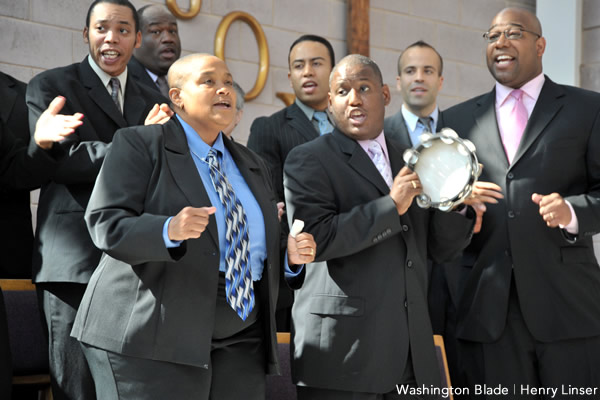
The choir at Metropolitan Community Church of Washington in 2008. (Washington Blade file photo by Henry Linser)
a&e features
Eastern Shore chef named James Beard Finalist
Harley Peet creates inventive food in an inclusive space

In a small Eastern Shore town filled with boutiques, galleries, and the occasional cry of waterfowl from the Chesapeake, Chef Harley Peet is most at home. In his Viennese-inflected, Maryland-sourced fine-dining destination Bas Rouge, Peet draws from his Northern Michigan upbringing, Culinary Institute of America education, and identity as a gay man, for inspiration.
And recently, Peet was named a James Beard Finalist for Best Chef: Mid-Atlantic – the first “Best Chef: Mid-Atlantic” finalist representing the Eastern Shore.
Peet, after graduation from the Culinary Institute of America, took a position as sous chef at Tilghman Island Inn, not far from Bas Rouge. Falling in love with the Eastern Shore, he continued his passion for racing sailboats, boating, gardening, and fishing, and living his somewhat pastoral life as he opened Bas Rouge in 2016 as head chef, a restaurant part of the Bluepoint Hospitality group, which runs more than a dozen concepts in and around Easton, Md.
Coming from a rural area and being gay, Peet knew he had his work cut out for him. He was always aware that the service and hospitality industry “can be down and dirty and rough.”
Now as a leader in the kitchen, he aims to “set a good example, and treat people how I want to be treated. I also want to make sure if you’re at our establishment, I’m the first to stand up and say something.”
The Bas Rouge cuisine, he says, is Contemporary European. “I’m inspired by old-world techniques of countries like Austria, Germany, and France, but I love putting a new spin on classic dishes and finding innovative ways to incorporate the bounty of local Chesapeake ingredients.”
His proudest dish: the humble-yet-elevated Wiener Schnitzel. “It is authentic to what one would expect to find in Vienna, down to the Lingonberries.” From his in-house bakery, Peet dries and grinds the housemade Kaiser-Semmel bread to use as the breadcrumbs.
Peet works to support the LGBTQ community inside and outside of the kitchen. “I love that our Bluepoint Hospitality team has created welcoming spaces where our patrons feel comfortable dining at each of our establishments. Our staff have a genuine respect for one another and work together free of judgment.”
Representing Bluepoint, Peet has participated in events like Chefs for Equality with the Human Rights Campaign, advocating for LGBTQ rights.
At Bas Rouge, Peet brings together his passion for inclusion steeped in a sustainability ethic. He sees environmental stewardship as a way of life. Peet and his husband have lived and worked on their own organic farm for several years. Through research in Europe, he learned about international marine sourcing. Witnessing the impacts of overfishing, Peet considers his own role in promoting eco-friendly practices at Bas Rouge. To that end, he ensures responsible sourcing commitments through his purveyors, relationships that have helped create significant change in how people dine in Easton.
“I have built great relationships in the community and there’s nothing better than one of our long-standing purveyors stopping in with a cooler of fresh fish from the Chesapeake Bay. This goes especially for catching and plating the invasive blue catfish species, which helps control the species’ threat to the local ecosystem.
Through his kitchen exploits, Peet expressed a unique connection to another gay icon in a rural fine-dining restaurant: Patrick O’Connell, of three Michelin starred Inn at Little Washington. In fact, Peet’s husband helped design some of O’Connell’s kitchen spaces. They’ve both been able to navigate treacherous restaurant-industry waters, and have come out triumphant and celebrated. Of O’Connell, Peet says that he “sees [his restaurants] as canvas, all artistry, he sees this as every night is a show.” But at the same time, his “judgment-free space makes him a role model.”
Being in Easton itself is not without challenges. Sourcing is a challenge, having to either fly or ship in ingredients, whereas urban restaurants have the benefit of trucking, he says. The small town “is romantic and charming,” but logistics are difficult – one of the reasons that Peet ensures his team is diverse, building in different viewpoints, and also “making things a hell of a lot more fun.”
Reflecting on challenges and finding (and creating) space on the Eastern Shore, Peet confirmed how important it was to surround himself with people who set a good example, and “if you don’t like the way something is going … move on.”
a&e features
What to expect at the 2024 National Cannabis Festival
Wu-Tang Clan to perform; policy discussions also planned

(Editor’s note: Tickets are still available for the National Cannabis Festival, with prices starting at $55 for one-day general admission on Friday through $190 for a two-day pass with early-entry access. The Washington Blade, one of the event’s sponsors, will host a LGBTQIA+ Lounge and moderate a panel discussion on Saturday with the Mayor’s Office of LGBTQ Affairs.)
With two full days of events and programs along with performances by Wu-Tang Clan, Redman, and Thundercat, the 2024 National Cannabis Festival will be bigger than ever this year.
Leading up to the festivities on Friday and Saturday at Washington, D.C.’s RFK Stadium are plenty of can’t-miss experiences planned for 420 Week, including the National Cannabis Policy Summit and an LGBTQ happy hour hosted by the District’s Black-owned queer bar, Thurst Lounge (both happening on Wednesday).
On Tuesday, the Blade caught up with NCF Founder and Executive Producer Caroline Phillips, principal at The High Street PR & Events, for a discussion about the event’s history and the pivotal political moment for cannabis legalization and drug policy reform both locally and nationally. Phillips also shared her thoughts about the role of LGBTQ activists in these movements and the through-line connecting issues of freedom and bodily autonomy.
After D.C. residents voted to approve Initiative 71 in the fall of 2014, she said, adults were permitted to share cannabis and grow the plant at home, while possession was decriminalized with the hope and expectation that fewer people would be incarcerated.
“When that happened, there was also an influx of really high-priced conferences that promised to connect people to big business opportunities so they could make millions in what they were calling the ‘green rush,'” Phillips said.
“At the time, I was working for Human Rights First,” a nonprofit that was, and is, engaged in “a lot of issues to do with world refugees and immigration in the United States” — so, “it was really interesting to me to see the overlap between drug policy reform and some of these other issues that I was working on,” Phillips said.
“And then it rubbed me a little bit the wrong way to hear about the ‘green rush’ before we’d heard about criminal justice reform around cannabis and before we’d heard about people being let out of jail for cannabis offenses.”
“As my interests grew, I realized that there was really a need for this conversation to happen in a larger way that allowed the larger community, the broader community, to learn about not just cannabis legalization, but to understand how it connects to our criminal justice system, to understand how it can really stimulate and benefit our economy, and to understand how it can become a wellness tool for so many people,” Phillips said.
“On top of all of that, as a minority in the cannabis space, it was important to me that this event and my work in the cannabis industry really amplified how we could create space for Black and Brown people to be stakeholders in this economy in a meaningful way.”

“Since I was already working in event production, I decided to use those skills and apply them to creating a cannabis event,” she said. “And in order to create an event that I thought could really give back to our community with ticket prices low enough for people to actually be able to attend, I thought a large-scale event would be good — and thus was born the cannabis festival.”
D.C. to see more regulated cannabis businesses ‘very soon’
Phillips said she believes decriminalization in D.C. has decreased the number of cannabis-related arrests in the city, but she noted arrests have, nevertheless, continued to disproportionately impact Black and Brown people.
“We’re at a really interesting crossroads for our city and for our cannabis community,” she said. In the eight years since Initiative 71 was passed, “We’ve had our licensed regulated cannabis dispensaries and cultivators who’ve been existing in a very red tape-heavy environment, a very tax heavy environment, and then we have the unregulated cannabis cultivators and cannabis dispensaries in the city” who operate via a “loophole” in the law “that allows the sharing of cannabis between adults who are over the age of 21.”
Many of the purveyors in the latter group, Phillips said, “are looking at trying to get into the legal space; so they’re trying to become regulated businesses in Washington, D.C.”
She noted the city will be “releasing 30 or so licenses in the next couple of weeks, and those stores should be coming online very soon” which will mean “you’ll be seeing a lot more of the regulated stores popping up in neighborhoods and hopefully a lot more opportunity for folks that are interested in leaving the unregulated space to be able to join the regulated marketplace.”
National push for de-scheduling cannabis
Signaling the political momentum for reforming cannabis and criminal justice laws, Wednesday’s Policy Summit will feature U.S. Sens. Raphael Warnock (D-Ga.), Jeff Merkley (D-Ore.), Elizabeth Warren (D-Mass.), and Chuck Schumer (D-N.Y.), the Senate majority leader.
Also representing Capitol Hill at the Summit will be U.S. Congresswoman Eleanor Holmes Norton (D-D.C.) and U.S. Reps. Earl Blumenauer (D-Ore.) and Barbara Lee (D-Calif.) — who will be receiving the Supernova Women Cannabis Champion Lifetime Achievement Award — along with an aide to U.S. Rep. David Joyce (R-Ohio).
Nationally, Phillips said much of the conversation around cannabis concerns de-scheduling. Even though 40 states and D.C. have legalized the drug for recreational and/or medical use, marijuana has been classified as a Schedule I substance since the Controlled Substances Act was passed in 1971, which means it carries the heftiest restrictions on, and penalties for, its possession, sale, distribution, and cultivation.
The U.S. Department of Health and Human Services formally requested the drug be reclassified as a Schedule III substance in August, which inaugurated an ongoing review, and in January a group of 12 Senate Democrats sent a letter to the Biden-Harris administration’s Drug Enforcement Administration urging the agency to de-schedule cannabis altogether.
Along with the Summit, Phillips noted that “a large contingent of advocates will be coming to Washington, D.C. this week to host a vigil at the White House and to be at the festival educating people” about these issues. She said NCF is working with the 420 Unity Coalition to push Congress and the Biden-Harris administration to “move straight to de-scheduling cannabis.”
“This would allow folks who have been locked up for cannabis offenses the chance to be released,” she said. “It would also allow medical patients greater access. It would also allow business owners the chance to exist without the specter of the federal government coming in and telling them what they’re doing is wrong and that they’re criminals.”
Phillips added, however, that de-scheduling cannabis will not “suddenly erase” the “generations and generations of systemic racism” in America’s financial institutions, business marketplace, and criminal justice system, nor the consequences that has wrought on Black and Brown communities.
An example of the work that remains, she said, is making sure “that all people are treated fairly by financial institutions so that they can get the funding for their businesses” to, hopefully, create not just another industry, but “really a better industry” that from the outset is focused on “equity” and “access.”
Policy wonks should be sure to visit the festival, too. “We have a really terrific lineup in our policy pavilion,” Phillips said. “A lot of our heavy hitters from our advocacy committee will be presenting programming.”
“On Saturday there is a really strong federal marijuana reform panel that is being led by Maritza Perez Medina from the Drug Policy Alliance,” she said. “So that’s going to be a terrific discussion” that will also feature “representation from the Veterans Cannabis Coalition.”
“We also have a really interesting talk being led by the Law Enforcement Action Partnership about conservatives, cops, and cannabis,” Phillips added.
Cannabis and the LGBTQ community
“I think what’s so interesting about LGBTQIA+ culture and the cannabis community are the parallels that we’ve seen in the movements towards legalization,” Phillips said.
The fight for LGBTQ rights over the years has often involved centering personal stories and personal experiences, she said. “And that really, I think, began to resonate, the more that we talked about it openly in society; the more it was something that we started to see on television; the more it became a topic in youth development and making sure that we’re raising healthy children.”
Likewise, Phillips said, “we’ve seen cannabis become more of a conversation in mainstream culture. We’ve heard the stories of people who’ve had veterans in their families that have used cannabis instead of pharmaceuticals, the friends or family members who’ve had cancer that have turned to CBD or THC so they could sleep, so they could eat so they could get some level of relief.”
Stories about cannabis have also included accounts of folks who were “arrested when they were young” or “the family member who’s still locked up,” she said, just as stories about LGBTQ people have often involved unjust and unnecessary suffering.
Not only are there similarities in the socio-political struggles, Phillips said, but LGBTQ people have played a central role pushing for cannabis legalization and, in fact, in ushering in the movement by “advocating for HIV patients in California to be able to access cannabis’s medicine.”
As a result of the queer community’s involvement, she said, “the foundation of cannabis legalization is truly patient access and criminal justice reform.”
“LGBTQIA+ advocates and cannabis advocates have managed to rein in support of the majority of Americans for the issues that they find important,” Phillips said, even if, unfortunately, other movements for bodily autonomy like those concerning issues of reproductive justice “don’t see that same support.”
a&e features
Juliet Hawkins’s music defies conventional categorization
‘Keep an open mind, an open heart, and a willingness to evolve’
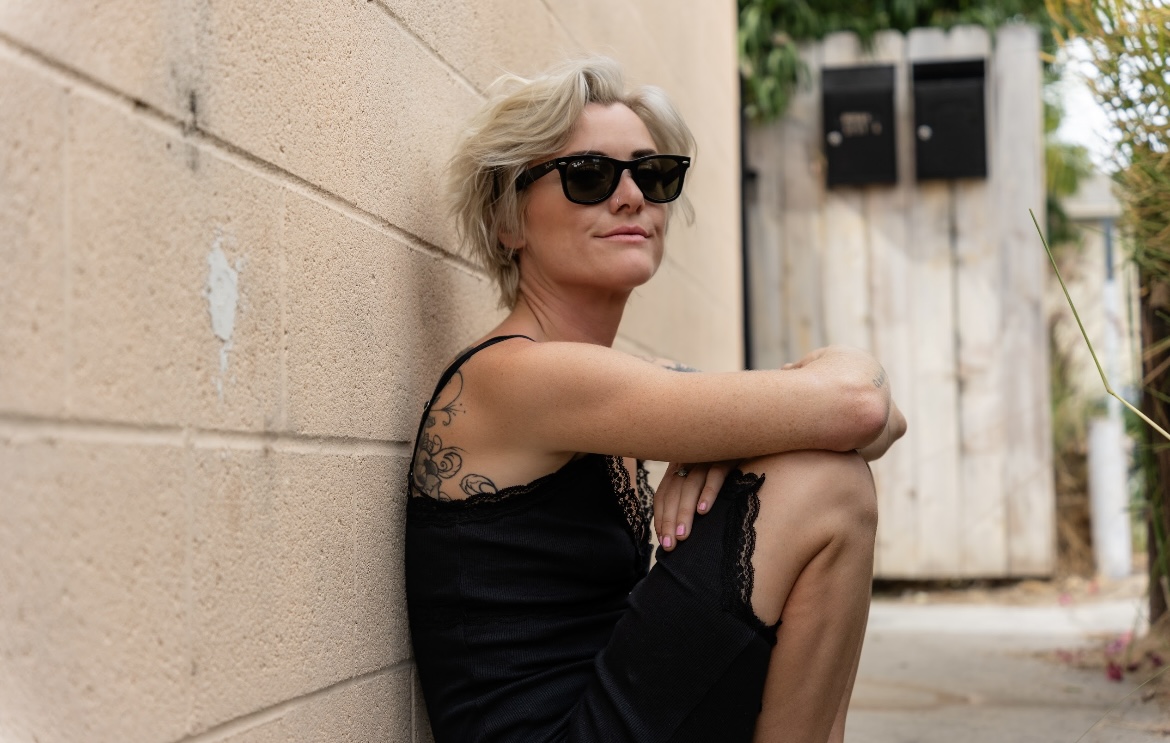
LONG BEACH, Calif. – Emerging from the dynamic music scene of Los Angeles, Juliet Hawkins seamlessly integrates deeply soulful vocals with contemporary production techniques, crafting a distinctive sound that defies conventional categorization.
Drawing inspiration from the emotive depth of Amy Winehouse and weaving together elements of country, blues, and pop, Hawkins’ music can best be described as a fusion–perhaps best termed as soulful electronica. Yet, even this characterization falls short, as Hawkins defines herself as “a blend of a million different inspirations.”
Hawkins’s musical palette mirrors her personae: versatile and eclectic. Any conversation with Hawkins makes this point abundantly clear. She exhibits the archetype of a wild, musical genius while remaining true to her nature-loving, creative spirit. Whether recording in the studio for an album release, performing live in a studio setting, or playing in front of a live audience, Hawkins delivers her music with natural grace.
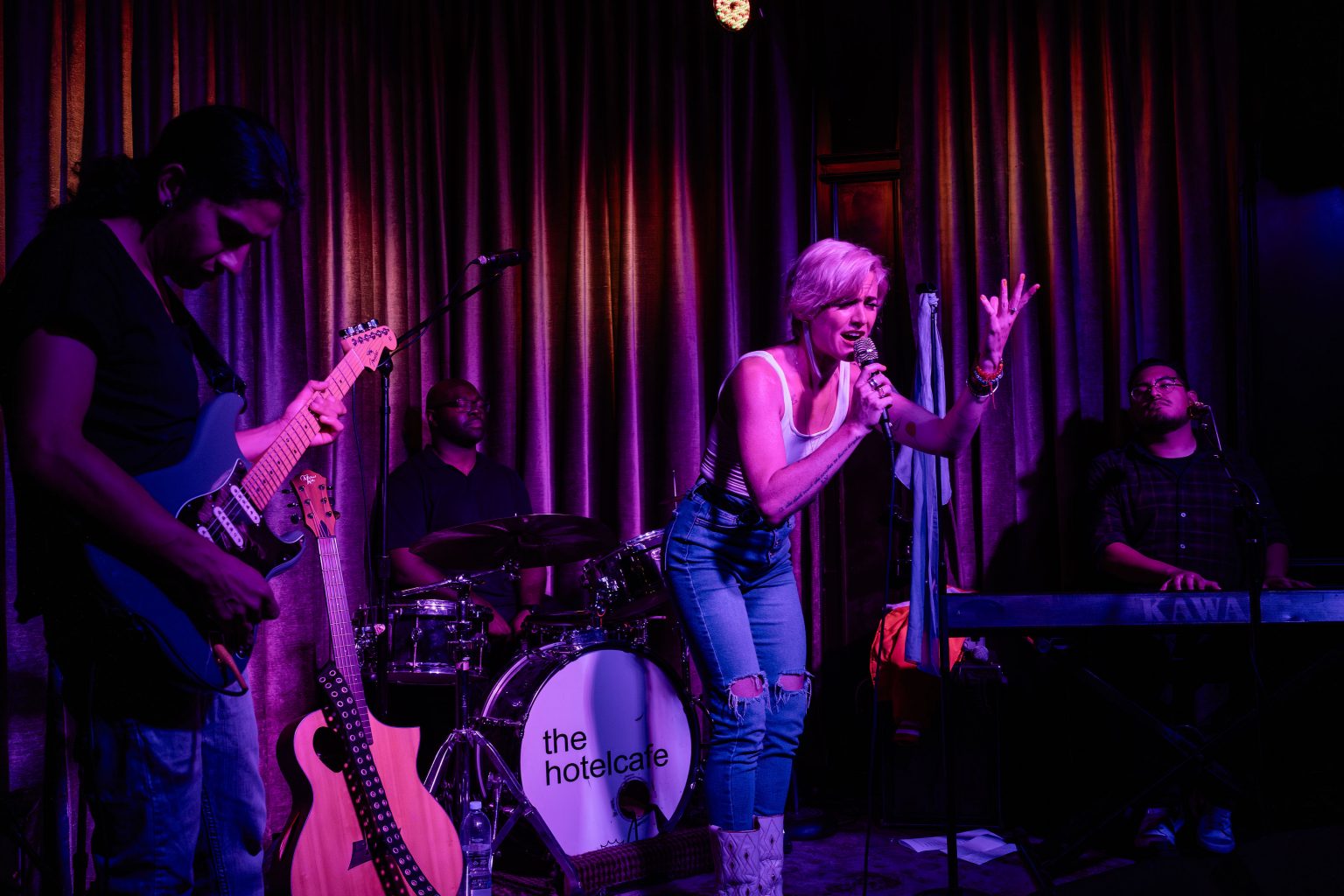
However, Hawkins’s musical journey is far from effortless. Amid personal challenges and adversity, she weaves her personal odyssey of pain and pleasure, transforming these experiences into empowering anthems.
In a candid interview with the Blade, Hawkins spoke with profound openness and vulnerability about her past struggles with opiate and heroin addiction: “That was 10 years ago that I struggled with opiates,” she shared. Yet, instead of letting her previous addiction define her, Hawkins expressed to the Blade that she harbors no shame about her past. “My newer music is much more about empowerment than recovery,” she explained, emphasizing that “writing was the best way to process trauma.”
Despite her struggles with addiction, Hawkins managed to recover. However, she emphasizes that this recovery is deeply intertwined with her spiritual connection to nature. An illustrative instance of Hawkins’ engagement with nature occurred during the COVID pandemic.
Following an impulse that many of us have entertained, she bought a van and chose to live amidst the trees. It was during this period that Hawkins composed the music for her second EP, titled “Lead with Love.”
In many ways, Hawkins deep spiritual connection to nature has been profoundly shaped by her extensive travels. Born in San Diego, spending her formative years in Massachusetts, and later moving to Tennessee before returning to Southern California, she has broadened her interests and exposed herself to the diverse musical landscapes across America.
“Music is the only thing I have left,” Hawkins confides to the Blade, highlighting the integral role that music has in her life. This intimate relationship with music is evident in her sultry and dynamic compositions. Rather than imitating or copying other artists, Hawkins effortlessly integrates sounds from some of her favorite musical influences to create something new. Some of these influences include LP, Lucinda Williams, Lana Del Rey, and, of course, Amy Winehouse, among others.
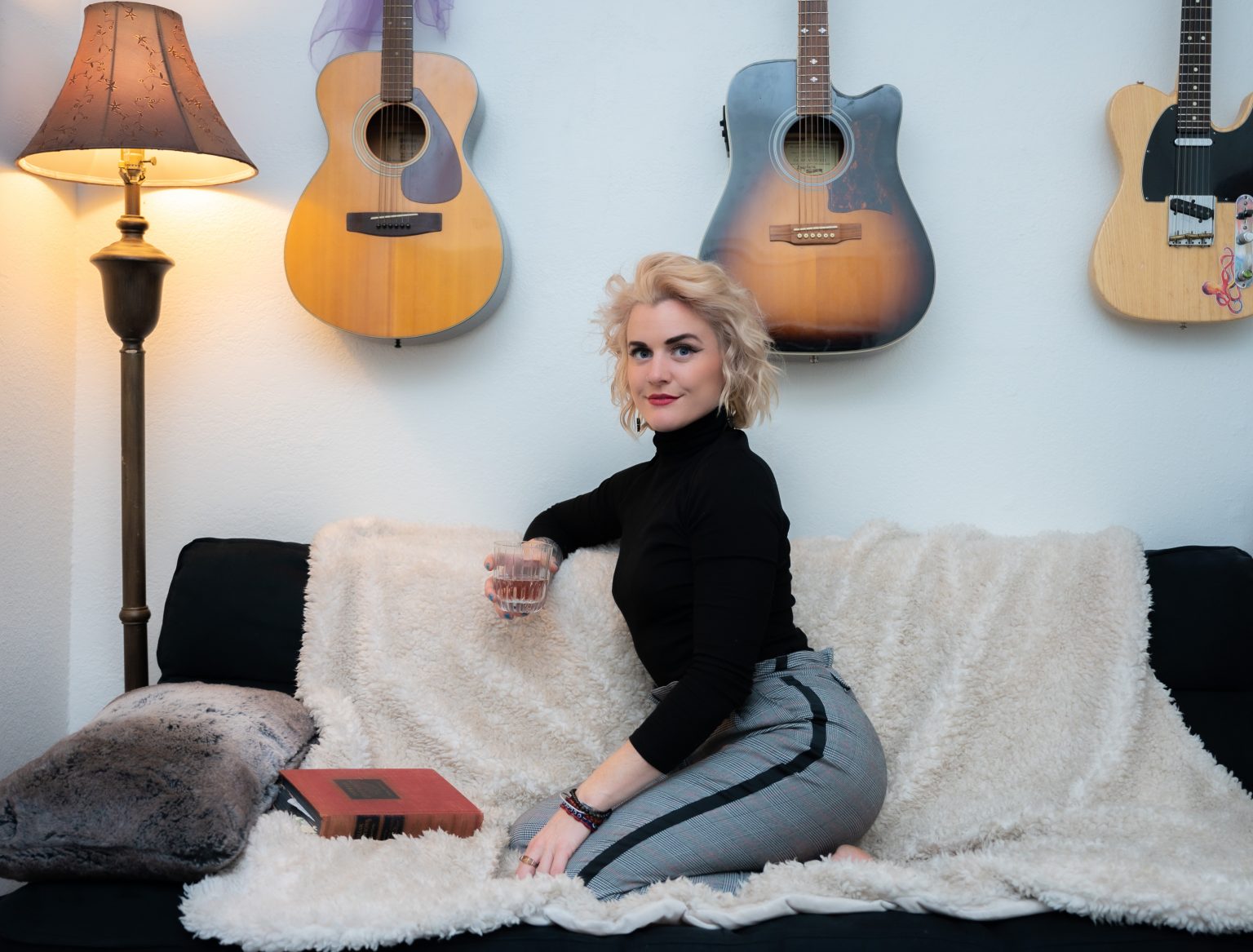
Hawkins has always been passionate about music—-she began with piano at a young age, progressed to guitar, and then to bass, eagerly exploring any instrument she could get her hands on. However, instead of following a traditional path of formalized lessons and structured music theory, Hawkins told the Blade that she “has a hard time following directions and being told what to do.”
This independent approach has led her to experiment with various genres and even join unexpected groups, such as a tribute band for Eric Clapton and Cream. While she acknowledges that her eclectic musical interests might be attributed to ADHD, she holds a different belief: “Creative minds like to move around.”
When discussing her latest musical release — “Stay True (the live album)” which was recorded in a live studio setting — Hawkins describes the experience as a form of improvisation with both herself and the band:
“[The experience] was this divine honey that was flowing through all of us.” She explains that this live album was uncertain in the music’s direction. “For a couple of songs,” Hawkins recalls, “we intuitively closed them out.” By embracing creative spontaneity and refusing to be constrained by fear of mistakes, the live album authentically captures raw sound, complete with background chatter, extended outros, and an extremely somber cover of Ozzy Osbourne’s “Crazy Train” coupled with a slow piano and accompanied strings.
While “Stay True” was a rewarding experience for Hawkins, her favorite live performance took place in an unexpected location—an unattended piano in the middle of an airport. As she began playing Beethoven’s “Moonlight Sonata”, Hawkins shared with the Blade a universal connection we all share with music: “This little girl was dancing as I was playing.”
After the performance, tears welled in Hawkins’ eyes as she was touched by the young girl’s appreciation of her musicianship. Hawkins tells the Blade, “It’s not about playing to an audience—it’s about finding your people.”
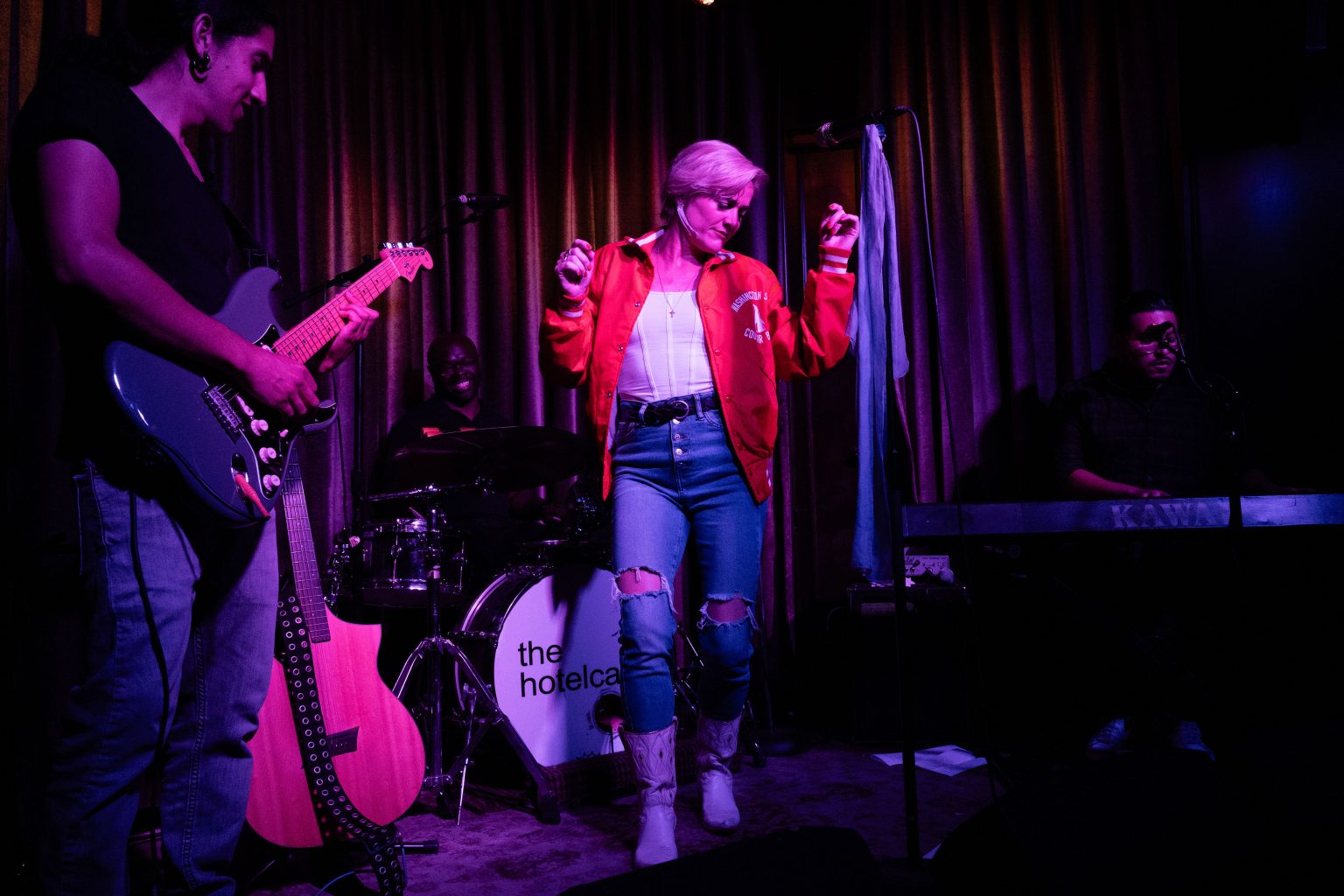
What sets Hawkins apart as an artist is her ability to connect with her audience in diverse settings. She highlights EDC, an electronic dance music festival, as a place where she unabashedly lets her “freak flag” fly and a place to connect with her people. Her affinity for electronic music not only fuels her original pop music creations, but also inspires her to reinterpret songs with an electronic twist. A prime example of this is with her electronic-style cover of Tal Bachman’s 90’s hit, “She’s So High.”
As an openly queer woman in the music industry, Hawkins is on a mission to safeguard artistic integrity. In songs like “My Father’s Men,” she bares her vulnerability and highlights the industry’s misogyny, which often marginalizes gender minorities in their pursuit of artistic expression.
She confides to the Blade, “The industry can be so sexist, misogynist, and oppressive,” and points out that “there are predators in the industry.” Yet, rather than succumbing to apathy, Hawkins is committed to advocating for gender minorities within the music industry.
“Luckily, people are rising up against misogyny, but it’s still there. ‘My Father’s Men’ is a message: It’s time for more people who aren’t just white straight men to have a say.”
Hawkins is also an activist for other causes, with a fervent belief in the preservation of bodily autonomy. Her self-directed music video “I’ll play Daddy,” showcases the joy of embracing one’s body with Hawkins being sensually touched by a plethora of hands. While the song, according to Hawkins, “fell upon deaf ears in the south,” it hasn’t stopped Hawkins from continuing to fight for the causes she believes in. In her interview, Hawkins encapsulated her political stance by quoting an artist she admires:
“To quote Pink, ‘I don’t care about your politics, I care about your kids.’”
When Hawkins isn’t writing music or being a champion for various causes, you might catch her doing the following: camping, rollerblading, painting, teaching music lessons, relaxing with Bernie (her beloved dog), stripping down for artsy photoshoots, or embarking on a quest to find the world’s best hollandaise sauce.
But at the end of the day, Hawkins sums up her main purpose: “To come together with like-minded people and create.”
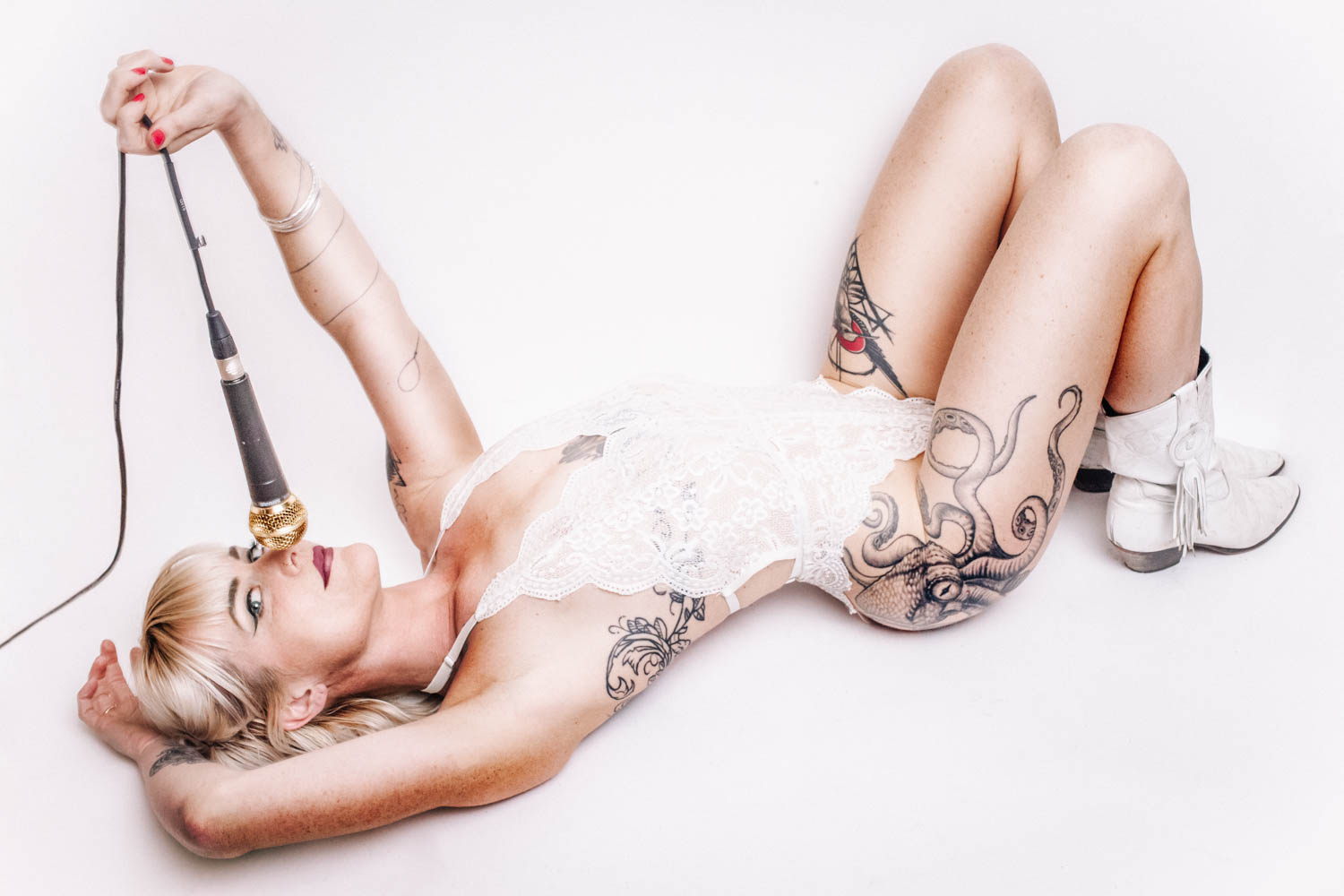
Part of this ever-evolving, coming-of-age-like journey includes an important element: plant-based medicine. Hawkins tells the Blade that she acknowledges her previous experience with addiction and finds certain plants to be useful in her recovery:
“The recovery thing is tricky,” Hawkins explains, “I don’t use opiates—-no powders and no pills—but I am a fan of weed, and I think psilocybin can be helpful when used at the right time.” She emphasizes the role of psychedelics in guiding her towards her purpose. “Thanks for psychedelics, I have a reignited sense of purpose … Music came naturally to me as an outlet to heal.”
While she views the occasional dabbling of psychedelics as a spiritual practice, Hawkins also embraces other rituals, particularly those she performs before and during live shows. “I always carry two rocks with me: a labradorite and a tiger’s eye marble,” she explains.
-

 State Department3 days ago
State Department3 days agoState Department releases annual human rights report
-

 Maryland5 days ago
Maryland5 days agoJoe Vogel campaign holds ‘Big Gay Canvass Kickoff’
-

 Politics4 days ago
Politics4 days agoSmithsonian staff concerned about future of LGBTQ programming amid GOP scrutiny
-

 District of Columbia1 day ago
District of Columbia1 day agoCatching up with the asexuals and aromantics of D.C.



